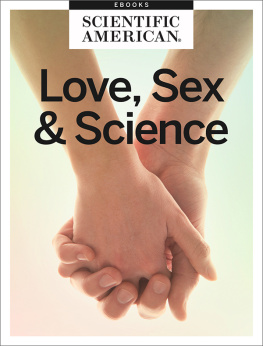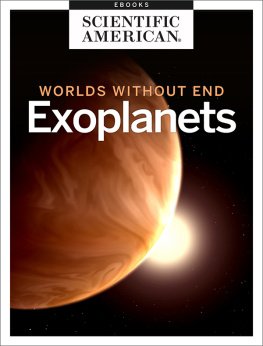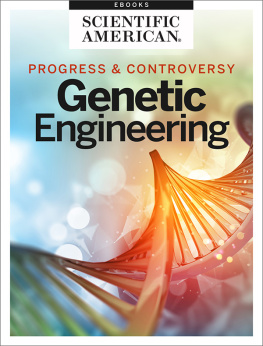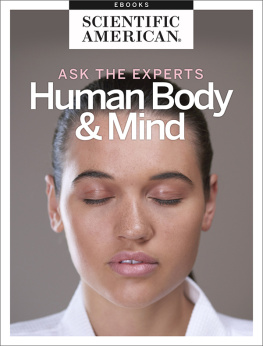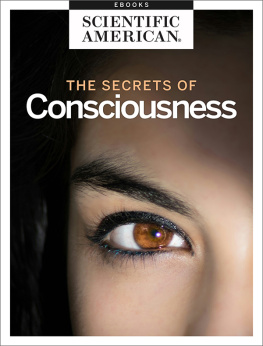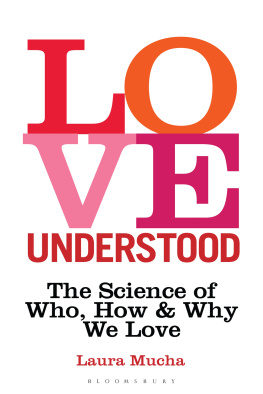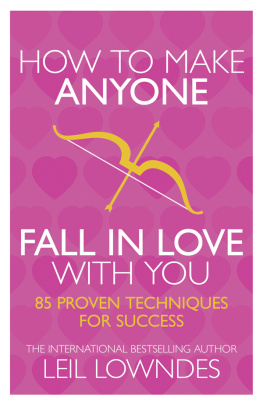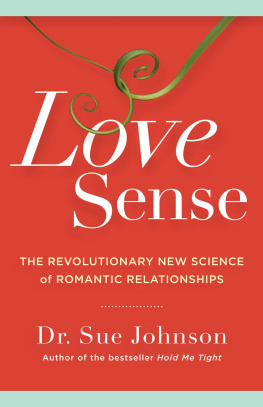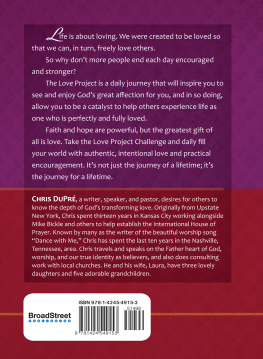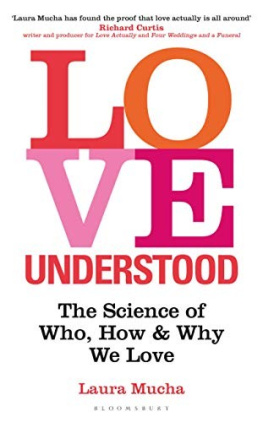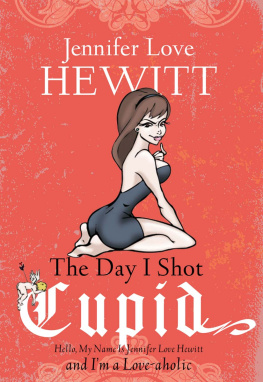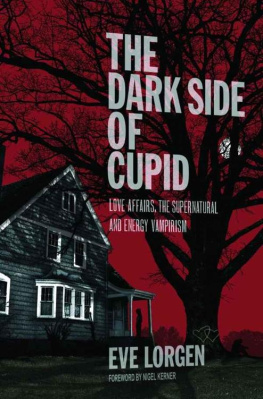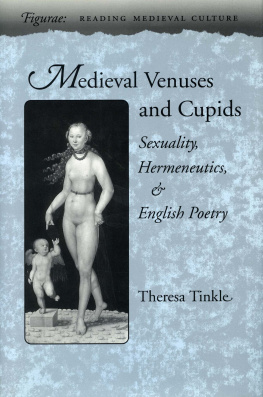LOVE, SEX AND SCIENCE
From the Editors of Scientific American
Cover Image: PM Images/Getty Images
Letters to the Editor
Scientific American
One New York Plaza
Suite 4500
New York, NY 10004-1562
or editors@sciam.com
Copyright 2017 Scientific American, a division of Nature America, Inc.
Scientific American is a registered trademark of Nature America, Inc.
All rights reserved.
Published by Scientific American
www.scientificamerican.com
ISBN: 978-1-466833845


LOVE, SEX AND SCIENCE
From the Editors of Scientific American
Table of Contents
Introduction
by Hannah Schmidt
Section 1
1.1
by Adrian F. Ward
1.2
by Lise Eliot
1.3
by Deborah Tannen
1.4
by J.R. Minkel
1.5
by Andrea Anderson
Section 2
2.1
by Eli J. Finkel, Paul W. Eastwick, Benjamin R. Karney, Harry T. Reis and Susan Sprecher
2.2
by Robert Epstein
2.3
by Charles Q. Choi
Section 3
3.1
by Wray Herbert
3.2
by Christie Nicholson
3.3
by Robert Epstein
3.4
by Suzann Pileggi Pawelski
Section 4
4.1
by Mark Fischetti
4.2
by Cassie Rodenberg
4.3
by Nira Liberman and Oren Shapira
4.4
by Katherine Harmon
4.5
by Melinda Wenner
4.6
by Chip Walter
4.7
by Gary Stix
4.8
by R. Douglas Fields
4.9
by Martin Portner
Section 5
5.1
by Jesse Bering
5.2
by Robert Epstein
5.3
by the Editors
5.4
by Robert Epstein
5.5
by Jesse Bering
Section 6
6.1
by Nikolas Westerhoff
6.2
by Daisy Grewal
Introduction: As Many Kinds of Hearts
It is virtually impossible to talk about love without being clich or repeating what thousands, probably millions, of writers, artists, and musicians have expressed before. Love has always been endlessly fascinating. Opinions of it vary, from Tennysons belief that tis better to have loved and lost/than never to have loved at all to Neil Gaimans rhetorical question, have you ever been in love? Horrible, isnt it? Whether a joy or a burden, love is ubiquitous
And, as this eBook will attest, scientists are just as interested as poets in the affairs of the heart. It might be more romantic to attribute ones feelings to Cupids unpredictable arrow, but it is more useful to understand how our brains and bodies are biologically involved in choosing the target. In an age when a marriages chances of ending in divorce seem as likely as a coin flip landing on tails, an assessment of our motivations could help us to choose more suitable partners and strengthen healthy relationships. Conversely, a better understanding of our partner could help us to communicate when someone of the opposite sex seems to be speaking Klingon.
Section 1 takes a look at perceived sex differences between men and women are we really as different as Mars and Venus? As our opening story shows, few other questions can get at the heart of this debate like Can heterosexual men and women ever be just friends? In fact, new research suggests that the answer is no. Subsequent articles question the accuracy of the Mars-Venus comparison, including The Truth About Boys and Girls, which reviews research on brain structure and behavioral differences, and He Said, She Said, which focuses on linguistics and differences in conversational style.
The control that this kind of knowledge offers us has already been exerted in the way we carefully tailor our online image, and Section 2 discusses the brave, not-so-new world of online dating. The increased digitization of our social interactions has changed the way men and women meet and get to know each other. The first story, Dating in a Digital World, analyzes the pros and cons of online romance. On one hand, dating websites have millions of users (with more joining everyday), and may be responsible for as much as a fifth of new relationships. On the other, they also change the way dating decisions are made, not always for the better. Section 3 continues this train of thought, assessing how and why we select the partners we do.
While science and technology offer an enormous amount of say in our own romantic destinies, there is also a good deal that is out of our sweaty-palmed hands. Section 4 looks at what happens to the brain when were in love. Several stories review fMRI studies; in particular All You Need Is Love finds that romantic love stimulates the same pathways as an addictive drug results that probably don't come as a complete surprise.
Section 5 focuses on questions of gender and sexuality. Do Gays Have a Choice? analyzes a wealth of scientific evidence and shows that sexual orientation is determined more by both genes and environment, rather than being a choice we make. Because discussions of gender and sexual orientation are often so politically contentious, it is important to understand the science behind subjects such as transsexuality and the sexual continuum in order to advance a more unbiased perspective.
But the science behind love and sex isnt all roses, and Section 6 looks at the darker side. Questions such as why people are drawn to narcissistic personalities or why some men buy sex are just as important as understanding why falling in love increases our creativity. To ignore the darker aspects of love is to trivialize it.
Were aware of the contradictions presented in this book. Loves paradoxes are one of the reasons why it is The Topic for cultural discourse. As Leo Tolstoy pointed out, there are as many kinds of love as there are hearts. This eBook cannot discuss all the kinds of love or all the kinds of hearts, but we hope it will be helpful in understanding your own.
-Hannah Schmidt
Book Editor
SECTION 1
Men Are from Mars, Women Are from Venus
Men and Women Cant be Just Friends
by Adrian F. Ward
Can heterosexual men and women ever be just friends? Few other questions haveprovoked debates as intense, family dinners as awkward, literature as lurid, ormovies as memorable. Still, the question remains unanswered. Daily experiencesuggests that non-romantic friendships between males and females are not onlypossible, but commonmen and women live, work, and play side-by-side, andgenerally seem to be able to avoid spontaneously sleeping together. However, thepossibility remains that this apparently platonic coexistence is merely a faade, anelaborate dance covering up countless sexual impulses bubbling just beneath thesurface.
New research suggests that there may be some truth to this possibilitythat wemay think were capable of being just friends with members of the opposite sex,but the opportunity (or perceived opportunity) for romance is often lurking justaround the corner, waiting to pounce at the most inopportune moment.
In order to investigate the viability of truly platonic opposite-sex friendshipsatopic that has been explored more on the silver screen than in the science labresearchers brought 88 pairs of undergraduateopposite-sex friends intoa science lab. Privacy was paramountfor example, imagine the fallout if two friends learned that oneandonly onehad unspoken romantic feelings for the other throughout their relationship. In order to ensure honest responses, theresearchers not only followed standard protocols regarding anonymity and confidentiality, but also required both friends to agreeverbally, and in front of each otherto refrain from discussing the study, even after they had left the testing facility. These friendshippairs were then separated, and each member of each pair was asked a series of questions related to his or her romantic feelings (or lackthereof) toward the friend with whom they were taking the study.

